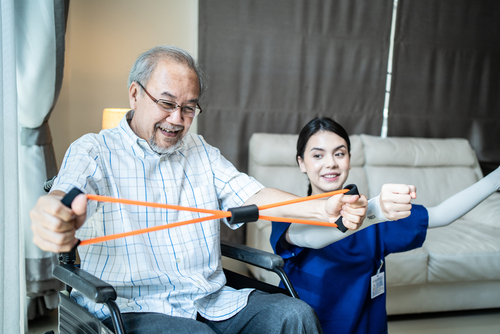When it comes to aging and maintaining independence, it's important to understand the options available to you, especially when it comes to government-funded aged care packages. These packages provide a variety of services to help older adults stay in their own homes as they age. But what exactly can you spend your aged care package on?
An aged care package can provide a range of services, including help with daily living activities, home modifications, and access to healthcare professionals.
Some of the most common services that can be accessed through an aged care package include services we offer here at Physio Inq, such as physiotherapy, occupational therapy, speech pathology, and exercise physiology.
Physiotherapy can help older adults maintain their strength, flexibility, and balance, which can help prevent falls and other accidents. Occupational therapy can help with activities of daily living such as dressing, grooming, and cooking, and speech pathology can help with communication, swallowing, and cognitive issues. Exercise physiology can help improve cardiovascular fitness, muscle strength, and overall health.
In addition to these services, there are also other similar services that can be accessed through an aged care package, such as podiatry, dietetics, and psychology. These services can also be helpful for older adults with specific health concerns.

What is a Home Care Package?
A Home Care Package, also known as an HCP, is a government-funded program that provides a range of services to help older adults stay in their own homes as they age. These services can include help with daily living activities, home modifications, and access to healthcare professionals.
One of the main advantages of a Home Care Package is that it is tailored to the individual's specific needs and goals. This means that the services provided through the package are tailored to help the individual maintain their independence and improve their quality of life.
The services that can be accessed through a Home Care Package include:
- Personal care such as bathing, dressing, and grooming
- Meal preparation and delivery
- Transportation to appointments and errands
- Home cleaning and maintenance
- Medication management and reminders
- Assistance with shopping and managing finances
- Social and recreational activities
- Respite care for caregivers
The cost of a Home Care Package is based on the individual's assessed needs and the level of package they are eligible for.
The four levels of Home Care Package are Level 1, Level 2, Level 3 and Level 4. Each level provides a different amount of funding, which can be used to access a range of services.
To access a Home Care Package, an individual must first be assessed by the Aged Care Assessment Team (ACAT) to determine their level of need.
This assessment will take into account factors such as the individual's health, functional abilities, and carer needs.
One of the benefits of using a Home Care Package is that it allows older adults to remain in their own homes, surrounded by familiar surroundings and loved ones. This can greatly improve the older person's quality of life, and also provide peace of mind for their family and caregivers.
Home Care Packages: How They Operate and Function
As mentioned above the program is divided into four different levels, each with its own funding amount and services available.
Level 1: This is the lowest level of package and is intended for individuals with basic care needs. The funding amount for Level 1 is relatively low and is typically used for services such as personal care, domestic assistance, and social support.
Level 2: Level 2 packages are intended for individuals with low-level care needs. The funding amount is slightly higher than Level 1 and can be used for services such as personal care, domestic assistance, social support, and some nursing and allied health services.
Level 3: Level 3 packages are intended for individuals with intermediate care needs. The funding amount is higher than Level 2 and can be used for services such as personal care, domestic assistance, social support, nursing, and a wider range of allied health services.
Level 4: This is the highest level of package and is intended for individuals with high care needs. The funding amount for Level 4 is the highest of the four levels and can be used for a wide range of services such as personal care, domestic assistance, social support, nursing, and a wide range of allied health services.
It's important to note that the amount of funding and the services available will vary depending on the individual's specific needs and the level of package they are eligible for.
The funding amounts for each level of Home Care Package (HCP) are determined by the Australian Government and are subject to change. However, as of 2022, the approximate funding amounts for each level are:
Level 1: Basic care needs – $9,179.75 a year
Level 2: Low care needs – $16,147.60 a year
Level 3: $35,138.55 a year
Level 4: High care needs – $53,268.10 a year
*The government contribution increases each year. Package funding correct as of September 2022.
It's also important to note that the funding from the package is not given to the individual, but to the provider delivering the services. The individual will have the opportunity to choose a provider and the provider will work with the individual to develop a care plan that outlines the specific services and goals for the individual. The care plan is reviewed and updated regularly to ensure it continues to meet the individual's needs.

Unlocking the Potential of Your Home Care Package: What other Services you can use to Help You Stay Independent and What You Can Spend Your Package On
1. Personal care such as bathing, dressing, and grooming
Personal care services, such as bathing, dressing, and grooming, are essential to maintaining independence and quality of life as we age.
Personal care services can include assistance with activities of daily living such as bathing, dressing, and grooming. These services can be provided in the individual's home by a trained care worker or through a home care provider.
When it comes to spending your HCP on personal care services, it's important to consider your individual needs and goals. For example, if you require assistance with bathing, dressing, and grooming on a daily basis, you may want to allocate a larger portion of your HCP funding towards personal care services. On the other hand, if you are able to manage these activities on your own but need occasional assistance, you may want to allocate a smaller portion of your HCP funding towards personal care services.
It's also important to note that the services available will vary depending on the level of package you are eligible for. An assessment by the Aged Care Assessment Team (ACAT) will be needed to determine your specific needs and the level of package you are eligible for.
2. Meal preparation and delivery
Meal preparation and delivery services can include assistance with planning and preparing meals, grocery shopping, and meal delivery to the individual's home. These services can be provided by a trained care worker or through a home care provider.
When it comes to spending your HCP on meal preparation and delivery services, it's important to consider your individual needs and goals. For example, if you require assistance with meal planning, preparation, and delivery on a daily basis, you may want to allocate a larger portion of your HCP funding towards these services. On the other hand, if you are able to manage these activities on your own but need occasional assistance, you may want to allocate a smaller portion of your HCP funding towards meal preparation and delivery services.
It's also important to note that the services available will vary depending on the level of package you are eligible for.
3. Transportation to appointments and errands
Transportation to appointments and errands can be a major challenge for older adults, especially those who are no longer able to drive or have limited mobility.
Transportation services can include assistance with getting to medical appointments, grocery shopping, social activities and other errands. These services can be provided by a trained care worker, volunteer or through a home care provider.
When it comes to spending your HCP on transportation services, it's important to consider your individual needs and goals. For example, if you require transportation on a regular basis, you may want to allocate a larger portion of your HCP funding towards transportation services. On the other hand, if you only need transportation occasionally, you may want to allocate a smaller portion of your HCP funding towards transportation services.
4. Home cleaning and maintenance
Home cleaning and maintenance can be a major challenge for older adults, especially those who have limited mobility or are no longer able to perform these tasks on their own.
Home cleaning and maintenance services can include assistance with tasks such as dusting, vacuuming, laundry, and general cleaning. These services can also include minor repairs and maintenance tasks such as changing light bulbs and replacing batteries in smoke detectors. These services can be provided by a trained care worker or through a home care provider.
When it comes to spending your HCP on home cleaning and maintenance services, it's important to consider your individual needs and goals. For example, if you require assistance with these tasks on a regular basis, you may want to allocate a larger portion of your HCP funding towards home cleaning and maintenance services. On the other hand, if you are able to manage these tasks on your own but need occasional assistance, you may want to allocate a smaller portion of your HCP funding towards home cleaning and maintenance services.
5. Medication management and reminders
Managing medications can be a complex task, especially for older adults who may be taking multiple medications with different dosing schedules.
Medication management and reminder services can include assistance with organizing and managing medication, setting up reminders to take medication, and monitoring for potential side effects or interactions between medications. These services can be provided by a trained care worker or through a home care provider.
if you require assistance with managing your medication on a regular basis, you may want to allocate a larger portion of your HCP funding towards medication management and reminder services. On the other hand, if you are able to manage your medication on your own but need occasional reminders, you may want to allocate a smaller portion of your HCP funding towards medication management and reminder services.
6. Assistance with shopping and managing finances
Managing shopping and finances can be a challenge for older adults, especially those who have limited mobility or are experiencing cognitive decline.
Assistance with shopping and managing finances services can include assistance with tasks such as grocery shopping, paying bills, and budgeting. These services can be provided by a trained care worker or through a home care provider.
7. Social and recreational activities
Participating in social and recreational activities is important for older adults, as it can promote physical and mental well-being, reduce feelings of isolation and loneliness, and improve overall quality of life.
Social and recreational activities services can include assistance with organizing and participating in social events, recreational activities, and outings. These services can be provided by a trained care worker or through a home care provider.
When it comes to spending your HCP on social and recreational activities services, it's important to consider your individual needs and goals. For example, if you require assistance with organizing and participating in social events on a regular basis, you may want to allocate a larger portion of your HCP funding towards social and recreational activities services. On the other hand, if you are able to participate in social events on your own but need occasional assistance, you may want to allocate a smaller portion of your HCP funding towards social and recreational activities services.
8. Respite care for caregivers
Caring for a loved one can be a challenging and demanding task, and it is important for caregivers to have access to respite care to take a break and recharge.
Respite care services can include assistance with providing temporary care for the care recipient, allowing the primary caregiver to take a break and attend to their own needs. These services can be provided by a trained care worker or through a home care provider, and can be provided in the individual's home or in a respite care facility.

What Services Are Not Included in a Home Care Package?
When it comes to home care packages, it's important to understand what services are not included in the package. Home Care Packages (HCPs) are designed to help older adults maintain their independence and continue to live in their own homes, but it's important to note that not all services are covered under these packages. Knowing what services are not included in a HCP can help you make informed decisions about how to best use your package to meet your needs.
Some of the services that are not typically included in a HCP include:
Personal Care: HCPs do not cover personal care services such as bathing, dressing, or grooming. These services may be covered under other programs such as the Commonwealth Home Support Programme (CHSP) or the National Disability Insurance Scheme (NDIS).
Nursing Care: HCPs do not cover nursing care services such as wound care, IV therapy, or administering medication. These services may be covered under other programs such as the CHSP or the NDIS.
24-hour Care: HCPs do not provide for 24-hour care services such as live-in care. These services may be covered under other programs such as the CHSP or the NDIS.
Home Modifications: HCPs do not cover the cost of home modifications such as installing a stair lift or modifying a bathroom for accessibility. These services may be covered under other programs such as the CHSP or the NDIS.
Dental care: HCPs do not cover dental care services such as regular check-ups, cleanings, or extractions. Dental care services may be covered under other programs such as the Medicare Benefits Schedule (MBS) or private health insurance.
Specialist medical treatment: HCPs do not cover specialist medical treatment such as cardiology, oncology, or neurology. These services may be covered under other programs such as the MBS or private health insurance.
Prescription medications: HCPs do not cover the cost of prescription medications, these costs will be covered under the Pharmaceutical Benefits Scheme (PBS)
Transport to appointments or events: HCPs do not cover the cost of transport to appointments or events, these costs will be covered under other programs such as the Community Transport Program or the National Disability Insurance Scheme (NDIS)
Home maintenance services: HCPs do not cover the cost of home maintenance services such as gardening, pest control, or pool maintenance.
it's also important to note that some services that are not covered under HCPs may be covered under other programs or services, such as the CHSP, NDIS, MBS, PBS or the Community Transport Program.
When it comes to finding a provider that can help you access the services included in your aged care package, it's important to choose a provider that is experienced and well-regarded. That's where Physio Inq comes in.
Physio Inq is a well-respected aged care provider that offers a variety of services, including physiotherapy, occupational therapy, speech pathology and exercise physiology.
With highly trained and experienced therapists, Physio Inq is dedicated to helping older adults maintain their independence and quality of life. They also offer a holistic approach to aged care, taking into account not only your physical health, but also your mental and emotional well-being.
So if you're looking for a provider that can help you get the most out of your aged care package, consider making a referral to Physio Inq. With a wide range of services and a team of dedicated therapists across Australia delivering In Home & Online Allied health Services across Australia, Physio Inq can help older adults stay healthy, active, and independent as they age.
Contact us today to learn more about how they can help you.
Date Published: Friday, January 20, 2023
Locate a Mobile Physiotherapy
Service Near me
Get the experience & convinence you deserve to support your or a loved one's allied health needs.
Our Mobile Physiotherapy team are currently serving & taking appointments in the following states and regions in Australia:
New South Wales
- Blacktown
- Blue Mountains
- Campbelltown And Macarthur
- Canterbury-Bankstown
- Eastern Suburbs Sydney
- Georges River
- Hawkesbury
- Inner East Sydney
- Inner West Sydney
- Lake Macquarie
- Lower North Shore
- Newcastle
- Northern Beaches
- North Sydney
- Parramatta
- Penrith
- Southern Highlands
- South West Sydney
- Sutherland Shire
- Sydney CBD
- The Hills Shire
- Upper North Shore
- Waverley
- Wollongong
Tasmania
Victoria
Need to get into direct contact with ur Client Services team? We're all ears. Call our team directly on 1300 731 733







